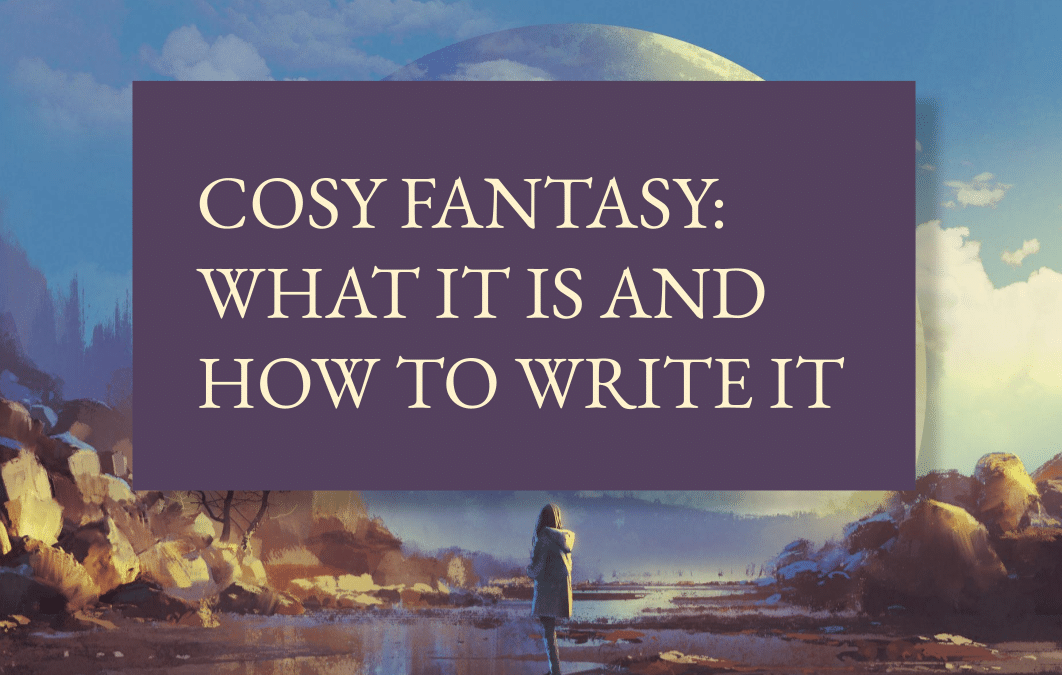Are you getting weary of writing about political intrigue, violence, or long, complicated events that impact the lives of many people? I don’t blame you. We get enough of that in real life. But is there a market for any other kind of fantasy?
Writers, take hope! An emerging subgenre called ‘cosy fantasy’ has appeared on the scene, and it may be just what you are looking for.
Brew up a cuppa and enjoy a cinnamon bun while we meet this new kid on the block!
But wait… cosy fantasy?
The ‘cosy’ subgenre first became popular in crime fiction, and it’s been around for many years. Cosy mysteries feature amateur sleuths in a small village or town. The violence (if there is any) occurs off-page, and the stories can have comedic elements. The sleuth (often a woman) has a group of friends who collaborate to solve the mystery. The books can centre around the character’s hobbies or interests, such as knitting, crosswords, a favourite food/beverage, or a pet. The overall vibe of the book is one of comfort, offering readers an escape into a gentler world, where friends band together to solve difficult problems. In a cosy mystery, the stakes are low, and a hot beverage is always ready to be poured.
Cosy crime fiction is incredibly popular. Series such as The No. 1 Ladies Detective Agency by Alexander McCall Smith, the Agatha Raisin series by M. C. Beaton, and the grandmother of them all, Agatha Christie’s Miss Marple mysteries, all continue to hit bestseller lists.
But what about fantasy?
Legends & Lattes
Cosy mysteries are well established. What’s more surprising is that if you look at this list of cosy fiction books on Goodreads, you see that Travis Baldree’s 2022 Legends & Lattes is the current #1 favourite. And it’s a cosy fantasy.
At first, you may wonder how a fantasy book featuring an orc as the main character could be classified as ‘cosy,’ especially when you throw in the rest of the cast: a dwarf, an elf, a gnome, and a succubus. We’re used to seeing these types of characters engaged in all sorts of derring-do and epic battles.
But this orc, Viv, is hanging up her sword. She’s done with being a mercenary killer and the violence that brings and wants to retire. Her dream is to open a shop in the bustling city of Thune to sell coffee, an exotic dwarvish drink she discovered on her travels. She longs to replicate the warm, convivial atmosphere of the coffee shop where she had her first brew, and suspects others might enjoy both the drink and the atmosphere, too.
As the book’s blurb states, this is a novel of ‘high fantasy and low stakes.’ Like so many cosy fiction books, it’s a story of found family, in which friends band together to achieve a goal – in this case, building a coffee shop.
I don’t know about you, but I was hooked by that premise alone. And I wasn’t disappointed when I read the book. It’s great fun to see Viv gather a team to help her accomplish her goal. But that doesn’t mean there isn’t danger. Her previous life catches up with her, bringing peril to her new one. The danger is real, but it’s not world-destroying. It’s more personal. Viv has to decide what is most important to her and whether she can hang up her sword forever.
A Psalm for the Wild-Built
If you scroll down further on the Goodreads list, you’ll come to #5: Becky Chambers’ 2021 A Psalm for the Wild-Built. This quiet tale of a tea-monk’s quest for meaning enthralled readers when it was published during the pandemic. The book’s dedication reads, ‘For anyone who needs a break,’ and it seemed to fulfill that need for many readers.
Psalm is more sci-fi than fantasy, as there are no fantastical races or magic in the book. The setting is an Earth-like moon called Panga. Centuries before the story’s beginning, humanity’s robot servants gained consciousness, put down their tools, and faded into the forests. Their absence caused humans to re-examine their society. They decided not to pursue the robots, to leave the Factory Age behind, and to refashion their society into a more agrarian one. Only one City remained, where Dex, the main character, lives.
The book opens with Dex leaving the City to become a tea-monk who travels to Panga’s villages, listening to people’s problems and giving them tea fashioned for their specific needs. But Dex’s dissatisfaction continues, even with this idyllic life, and prompts a visit to a remote hermitage in the wilderness. On the way, a robot steps out of the trees and confronts Dex with the question, ‘What do humans need?’
This is the central theme of the book, and the answer unfolds in a series of conversations between Dex and Mosscap, the robot, as they travel together to the hermitage.
The danger in Psalm is more existential, although there are a few moments of physical danger. In that way it differs slightly from Legends. But they are similar in their low-stakes, found-family feel.
Cosy fantasy tropes
Every genre has their tropes, and cosy fantasy is no exception. Here are three of the most important to keep in mind if you want to write one.
Low stakes. I’ve mentioned this a few times now, but it bears repeating. Cosy fantasy books turn down the tension. Sure, there are problems to be solved and even dangers to overcome. But these dangers are not life-threatening or end-of-the-world alarming. Viv risks losing her coffee shop. Dex searches for meaning even in a near-perfect, utopian world. But these are not things that matter in a pulse-pounding, stay-up-all-night-reading type of way. So how to keep readers satisfied with this type of fantasy book? That’s where the next two tropes are important.
Relatable problems. Trying to build a new life after choosing to leave everything familiar is a problem that faces both Dex and Viv in our examples. And it’s one that everyone can relate to. Many of us long for the day when we can leave our ‘old’ lives behind and either pursue a dream (Viv) or figure out what is important in life (Dex). These are not earth-shattering problems. But they are familiar ones, and seeing how the character solves them (which may help us solve our own) is what keeps the reader engaged in the book.
Characters to care about. Cosy fantasy can’t rely on the usual excitement, intrigue, or sword-slinging to keep the readers turning the pages. While engaging characters are important for any type of fantasy, in cosy fantasy, the characters have to truly shine in order for the reader to buy in. Viv is interesting to fantasy readers because she is an orc who is tired of violence. That pulls us in, and her quiet perseverance in pursuing her dream keeps us rooting for her. Dex’s dissatisfaction with both the old job in the City and the new one as a tea monk is familiar to those who long for something more in their lives. A quest for answers to life’s mysteries is one that readers can relate to. Again, it is Dex’s willingness to stay on the journey of discovery that creates sympathy in us.
In the end…
Cosy fantasy is an exciting new genre for writers to explore. Judging by the popularity of these books, it has huge potential to appeal to readers. So if you long to explore a kinder, gentler fantasy world, why not try writing one? Tackling the task with a candle lit and snuggled in a blanket may help the words flow!
L. A. Smith has always been a fan of the art of storytelling. She began writing almost twenty years ago and has been chasing the muse ever since. Her historical fantasy trilogy, The Traveller’s Path, was completed in 2022. Visit her at lasmithwriter.com.
Do you write fantasy or science fiction?
Join our email list for regular writing tips, resources, and promotions.

